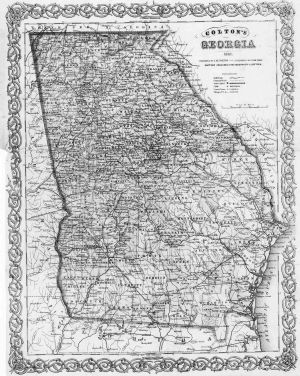 “Young Brother Singleton,” identified as a theology student at Mercer University, today gives “an interesting discourse” to the congregation at Bethesda Baptist Church in Greene County, Georgia.
“Young Brother Singleton,” identified as a theology student at Mercer University, today gives “an interesting discourse” to the congregation at Bethesda Baptist Church in Greene County, Georgia.
He is sponsored, one would surmise, by Pastor Henry Holcomb Tucker, who doubles as university professor of metaphysics and belles-lettres. Besides a letter granted to member Sarah Jones, no other business is brought before the assembled, and thus they depart, going about their own business, according to church clerk William A. Overton.
Singleton isn’t the average student in the small university community of Penfield and is newly established there–if in fact he is even officially a student at this time.
Born in Northampton, England, in 1830, Singleton was a skillful cabinet maker with limited, “ordinary” education who immigrated to America at age twenty with a chest of tools from his trade. Having spent some time in New York and other cities, he eventually settled in Augusta. “His life for several years was a mixture of business and pleasure,” wrote Baptist biographer Jesse Campbell. “His wages were good, but he spent them freely and saved but little.” Singleton married and had two children before coming under spiritual conviction and professed “a change of heart” that was “real and radical” to everyone, it was said, who knew him. Alas, this metamorphosis was followed by the death of his dear family. Rather than devastating him, these occurrences “deepened the impressions of his call to the ministry, and removed the earthly obstacles to his consecration to the work,” said Campbell, who was Singleton’s contemporary in Georgia Baptist service.
Singleton is licensed by Greene Street Church in Augusta before moving to Penfield to study theology, a change of venue Campbell noted as happening in June 1862—six weeks or more after this sermon. Whenever he may have arrived on his new field of endeavor, from all appearances it is a removal with bright expectations for him and those he intended to serve. Said then-Mercer President Nathaniel Macon Crawford: “His feelings were tender, his sympathies easily flowing, and, at the same time, deep, his faith strong, his hope firm, and his consecration unaffected and unfaltering. He was remarkable for what was called ‘a gift in prayer.’”
Prayer is a commodity desired by many in coming weeks and months as New Orleans, that jewel of the South, is captured by forces under Union Admiral David Farragut on 25 April, followed the next day by the surrender of the Confederate garrison at Fort Macon, North Carolina. In the weeks following, the Union advances continue as the ironclad CSS Virginia is scuttled in James River north of Norfolk, Virginia, on 11 May, and Georgians fight with abandon among the 40,000 Confederates assembled in battle against an equal number of federal troops in the Battle of Fair Oaks on 31-May to 1 June. Subsequently, battles on Southern fields proliferate—the Battle of Memphis on 6 June; the Battle of Cross Keys on 8 June; and the Battle of Mechanicsville on 26 June.
Win or lose, every battle is accompanied with injury, death, and privation, and the gift of prayer is a welcomed tool of the trade in the hands of those skillfully fashioning the spiritual lives of believers in states North and South in the spring and summer of 1862.
Sources: Conference Minutes of Bethesda Baptist Church Union Point (Greene County) Georgia August 1817 to December 1866, transcribed and Indexed by Vivian Toole Cates, page 238; Jesse H. Campbell, 1874, page 398-399; Robert L. Robinson, History of the Georgia Baptist Association, 1928, page 236; more information (link)
Article written by Arlette Copeland, Special Collections Assistant, Jack Tarver Library Special Collections, Mercer University, Macon, GA


